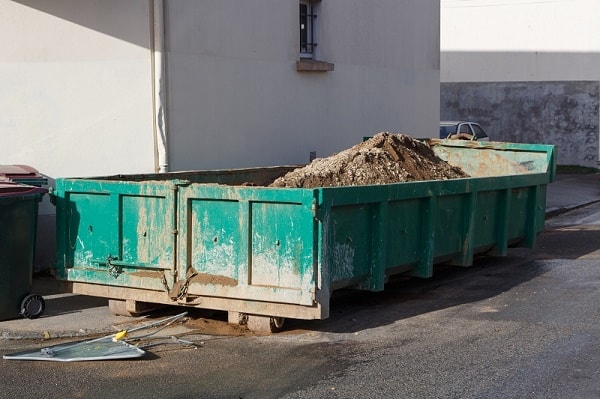Now that winter is underway (at least in most of the world), making your home comfortable for the colder months is more important than any other point in the year. If you are not prepared, then you might run into issues that you are not able to fix until the snow and ice clear up again.
Bound Brook, New Jersey dumpster rentals are easier than ever before thanks to Eagle Dumpster Rental in Somerset County.
While it can be tempting to just relax by a warm heater or fireplace indoors, preparing ahead of time makes a huge difference. Not only can winter throw plenty of curveballs at you, but if you take the right precautions, you can avoid costly mistakes or irritating issues that might arise in the cold.
Prepare the Roof
It is a good idea to look at your roof before winter hits you too hard. Not only can the cold sometimes cause existing damage to get worse, but the amount of rain and/or melting snow you will have to deal with can lead to serious leaks.
A damaged roof that is missing shingles can also be a major source of lost heat, which can chill your house in colder weather and force you to waste more money and power on heating. If you are really unlucky, snow could even fall from your roof avalanche-style, potentially hurting a passer-by.
Check the Gutters
Your gutters are a valuable part of your roof, draining away all of the water and allowing you to avoid some fairly major damage. However, clogged gutters or those full of trapped water can become a huge problem when winter begins to freeze water and drop hail or snow on you.
Remember that snow will eventually melt, and sometimes it will even come in waves during winter, melting and then returning with the next snowfall. If your gutter is blocked, that can be a lot of water flooding your yard or garden, with no real way to stop it until winter ends.
Protect Pipes
Like gutters, pipes can suffer damage if water freezes inside them. Adding insulation is always a good idea – the insulation does not cause problems in warm weather but offers a huge amount of protection In winter if you know how to place it correctly. A damaged pipe can be a serious problem.
It is important to make sure that key pipes are not exposed to too much cold; however you manage that. Insulating a garage or attic containing important pipework can be a good method, as can simply covering your boiler up with a material that helps trap the heat inside it and retains the energy.
Protect Wooden Surfaces
Wood is a common choice for decks, patios, and other outdoor decorations. However, wood can end up rotting quite easily if you are not careful, especially if it is a newly-built deck that might not have had all the necessary treatments yet.
Be sure to cover over any wooden surfaces that might end up getting damaged with a tarp, especially those that are meant to take your entire weight or hold furniture during the summer. If something snaps and splinters underfoot, you could end up with a serious injury.
Empty Water Containers
Always make sure to empty any outdoor appliances that might get frozen when the weather turns bad. If you leave a watering can outdoors and the water inside freezes (making it expand), then it is entirely possible that it might start to crack and become unusable in the warmer months.
Rain barrels and other tough containers should be fine, but things like hoses and sprinklers are a good place to check. If they are still full of water, then you will want to flush them out or drain them before it freezes and causes some potential damage to the interior parts.
Secure your Plants
If you have been growing any outdoor plants, then be sure to bring them indoors before the snow hits. While some plants can survive the winter, it is far better to simply take them indoors – they are likely to die if you leave them out in the cold.

For plants that you can’t bring in, there are other ways to cover them up and protect them. Be sure to look up what each plant might need to stay healthy, whether that is certain conditions, a specific kind of covering, or just a certain sort of wind protection.
Clear Your Garden
It is a good idea to bring in anything in your garden that you feel capable of carrying indoors. While you can leave outdoor furniture where it belongs, it is a good idea to shelter things like mowers, outdoor tools, temporary outdoor furniture, and standing grills.
This is all to make sure that they do not take any unnecessary damage or start to wear down quickly, something that can happen if the winter is especially bad. The less you leave something outdoors and exposed to the elements, the lower the risks are that you will have to replace something in spring.
Seal your Windows
If you have not done it already, then it might be a good idea to seal the space around your windows and doors, trapping the heat in and preventing sudden leaks of warmth. This would mean that you end up paying more for the same amount of heat since some of the heating leaks out anyway.
By sealing the gaps in those surfaces, you are able to prevent as much heat from leaking out. Drafts and sudden cold spikes will not be as much of a problem, even in rooms with a lot of windows directly exposed to the cold air.
